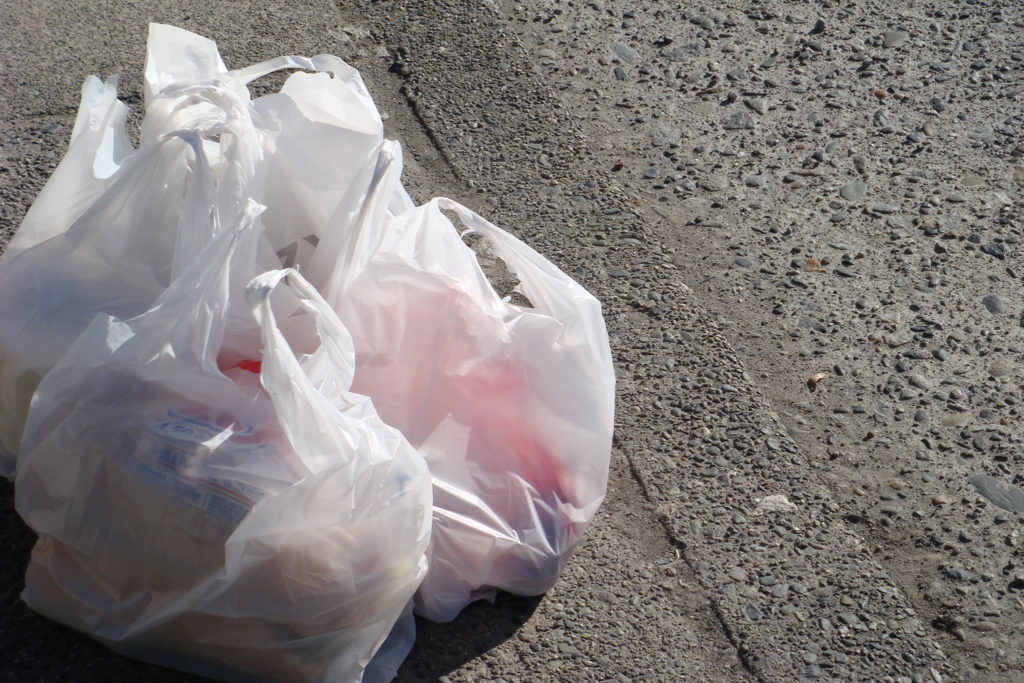 On New Year’s Day, Homer and Haines joined a growing laundry list of Alaskan communities banning single-use plastic bags less than 2.5 mils thick. As of January 1, Anchorage, Bethel, Cordova, Haines, Homer, Hooper Bay, Kodiak, Palmer, Soldotna, Unalaska, and Wasilla all have restrictions on single-use plastic bags in effect.
On New Year’s Day, Homer and Haines joined a growing laundry list of Alaskan communities banning single-use plastic bags less than 2.5 mils thick. As of January 1, Anchorage, Bethel, Cordova, Haines, Homer, Hooper Bay, Kodiak, Palmer, Soldotna, Unalaska, and Wasilla all have restrictions on single-use plastic bags in effect.
In Homer, the revision to the City Code was approved through Proposition A, with 748 yes votes, 406 no votes, and 28 percent voter turnout. According to Homer News, Homer’s city council banned plastic bags in 2012 with an ordinance, but it was repealed in 2013 through a ballot initiative. Though the new ban became effective on January 1, the proposition allows retailers to continue providing single-use plastic bags until their existing inventory runs out or until February 14, 2020, whichever occurs first. How generous!
In Haines as of January 1, it is unlawful for businesses to provide single-use, non-compostable plastic shopping bags to customers. Not all plastic bags are banned, such as those for packaging bulk items like fruits or nuts at a grocery store, and the Haines Borough Assembly’s ordinance does not contain penalties for businesses that do not comply with the ban.
The problems with plastic bag bans are numerous and lead to unintended consequences for local economies. Contrary to conventional wisdom, paper and cloth bags are more resource-intensive to produce and require more energy to recycle. Standard reusable cotton grocery bags need to be used 131 times to “ensure that they have a lower global warming potential” than single-use plastic bags used only once!
Even if one were to ignore the fact that single-use plastic bags comprise only 2 percent of all litter, and bans cause a negligible reduction in pollution, the consequences on local businesses may be staggering and ripple through the local economy. According to the Homer News, Brandy Super voted against the bag ban because:
“I’m looking at really the longterm [sic] impact on even some of our other business owners. Like restaurants and stuff like that. You know, they’re having to charge their customer extra money even for them and it puts people in a hard spot.”
Super’s intuition is right: a single-use plastic bag ban means businesses need to substitute more expensive paper bags or thicker plastic bags, which may require raising prices, cutting hours, or reducing staff to offset the cost. In the most extreme cases, businesses cannot absorb the 40 to 200 percent cost increase for grocery bags and must shut down instead. Is that a recipe for a vibrant economy?
Local business owners should decide what kind of bags to provide in their stores, and consumers should decide whether to use store-provided bags or bring their own reusable alternative. Even if plastic bag bans were effective—which they’re not—government’s role is not to mandate to free citizens what type of bags will be permitted.
**********
Photo by velkr0, CC by 2.0.